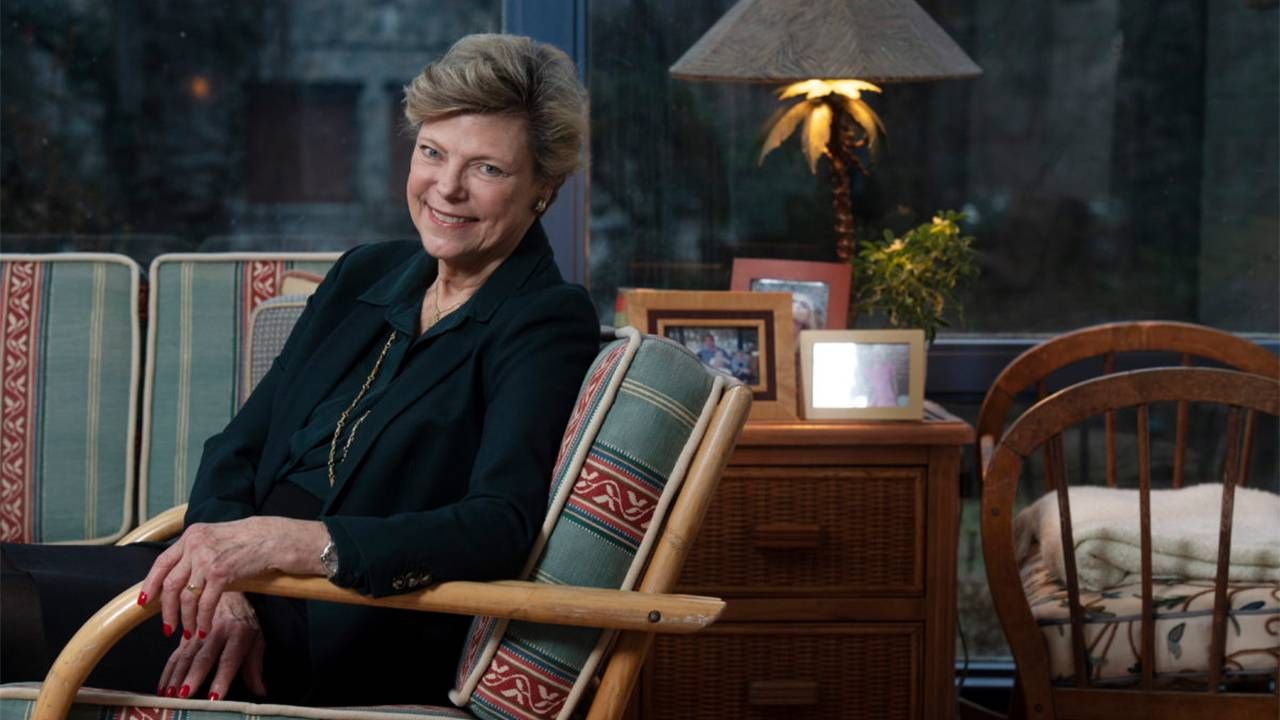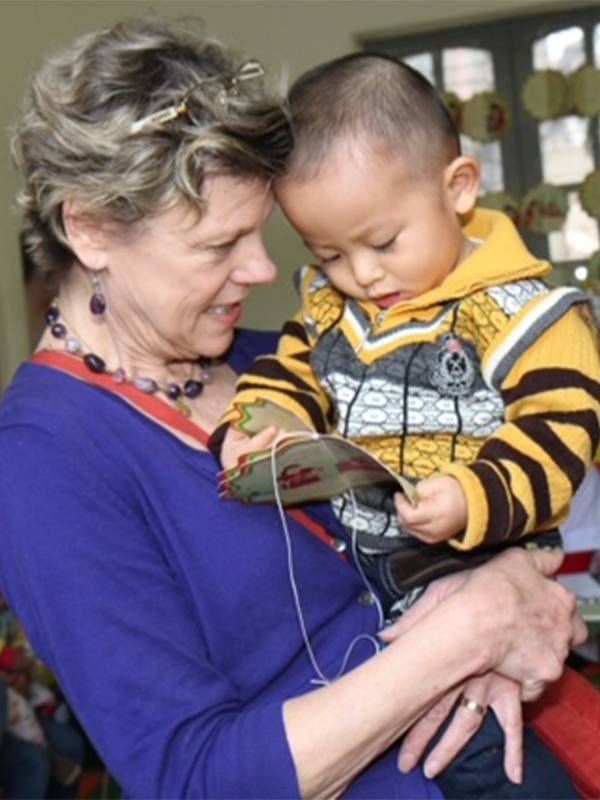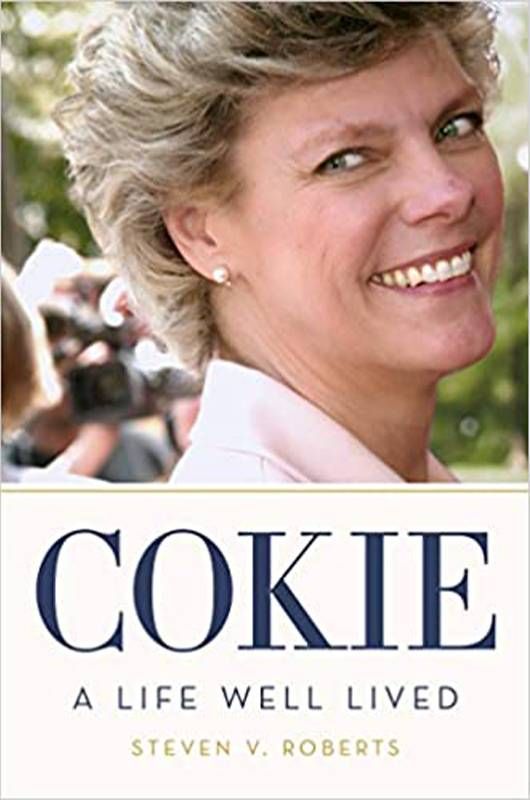My Wife, Cokie Roberts
A conversation with Steven Roberts, author of a new book about the beloved NPR and ABC journalist
It's been a little over two years since we lost Mary Martha Corinne Morrison Claiborne Boggs Roberts to breast cancer at age 75. The story goes that her older brother Tommy couldn't pronounce Corinne, so he gave her the nickname "Cokie" and it stuck. But when she first came to NPR in 1977, Roberts heard that President Frank Mankiewicz wasn't wild about having an on-air reporter named Cokie. In response, she signed off her story using all seven of her names. Point made. Don't mess with Cokie Roberts.

From then on, she was always Cokie: as one of the "founding mothers" of NPR, covering Congress there and in her weekly Morning Edition analysis segment that became "Ask Cokie;" as co-anchor on ABC's "This Week" (I worked with her at NPR and ABC); on the covers of five national bestselling books about women who contributed to American political history and as a mentor to young women journalists, empowering them to navigate their way through the business.
"She never, ever lost sight of the fact that she was very privileged as a pioneering woman, that she was given a platform and a chance to speak not just for herself, but for other women."
Her husband, journalist Steve Roberts, has now written an endearing book about his wife of 53 years, "Cokie: A Life Well Lived," and spoke with me about her work, faith, humanity, 17 years with metastatic breast cancer and tragedies that struck her family, including the death of her father, U.S. House Majority Leader Hale Boggs, in a 1972 plane crash (her mother, Rep. Lindy Boggs, succeeded him in Congress), her older sister dying of cancer at 51 and her baby brother dying in infancy.
For Steve Roberts, a professor of media and public affairs at George Washington University and longtime New York Times reporter, there was only one way to face the grief of losing Cokie — by throwing himself into researching and writing the book dedicated to the woman he calls "The Love of My Life."
Here are highlights of our interview, which has been edited for length and clarity:
Next Avenue: I've always remembered one piece of advice Cokie offered after all the tragedy and loss in her life. When you lose someone close to you — a spouse, close family member or friend — Cokie said, 'There's no such thing as closure. It's a terrible word. The grieving process is different for everyone, but it never closes.' What's your journey been like?
Steve Roberts: Not long after she died, I decided that this was going to be the way I grieved, the way I celebrated, the way I embraced her memory. I still live in the house we shared for forty-two years, sleep in the same bed. We were married in that house fifty-five years ago when it belonged to her parents. So, I'm surrounded by memories of her and that's the way I want it.
Some people grieve by turning the page, by leaving to start a new life. I don't want to start a new life in that sense. But I did want to capture her story, and it's been a great gift for me.
It's been painful at times, exacerbated by COVID. I say in the book that every interview I did — and I did a great many with her old friends — everyone ended in tears, their tears and my tears. I needed a waterproof keyboard on my computer.
'Cokie' Excerpt: Cokie in the Mud
Some of my favorite photos of Cokie were taken on her trips for Save the Children, surrounded by little kids. On one harrowing journey to Vietnam, Cokie brought our daughter, Becca, along, and they were visiting a school at the top of a mountain. Carolyn Miles, for many years the CEO of Save the Children said: "It was raining, pouring down rain. And we were in two SUV-type trucks going up the mountain and it was super slippery. The road was just like a dirt road, but now a mud road and the car was sliding crazily up this road. There was a steep drop off on either side of the road, and Cokie turned around to me and she said, 'If we fall off this mountain, you're dead.' And I said, 'If we fall off this mountain, we are all dead.'"

They finally made it to the top, and Cokie — who never owned a pair of jeans, or hiking boots or athletic wear of any kind — was dressed in a skirt and leather shoes. "So she got out of the car," Miles recalls, "and as soon as she got out of the car, she sank into the mud in her little flat shoes. And she slogged through the mud, it was up over her ankles and we get to the school and she's got tons of mud all over her shoes. And there's kids running around all over the place, right? And so she jumps up and down to get the mud off of her shoes and the mud splatters all over the place and the kids start laughing. They're just laughing hysterically at this woman, with the mud all over her shoes, this crazy lady jumping up and down with the mud splattering everywhere.
So then she thought, okay, this is really making them happy so I'm just going to keep doing it. So she did that awhile till the kids settled down." The area is so remote that their families have to bring the children to the school every Sunday afternoon and pick them up at the end of the week. "It takes them hours and hours and hours to walk home," says Miles, "but education is so important to these families that that's what they want to do. And I remember both Cokie and I were blown away by that school and I will never forget that visit."
From the book COKIE: A LIFE WELL LIVED by Steven V. Roberts. Copyright © 2021 by Steven V. Roberts. Published by Harper, an imprint of HarperCollins Publishers. Reprinted with permission.
What kind of advice can you give other people who suffer a similar loss?
I'm not big on advice because I think everybody has to find their own path. This is one of the most elemental experiences in human existence. Not everybody gets married. Not everybody has children. Not everybody graduates from school. But everybody mourns. And sometime in their lives, everybody grieves. It is a universal experience, and everybody has to figure it out for themselves.
My son [Lee] told me that the father of a good friend of his died, and the mother put the house on the market six weeks later. That's not me. Find something that you can do to celebrate your loved one. Maybe that's good advice. At least for many people, that would be a healthy way of grieving.
Cokie died in 2019 on September 17th. That's Constitution Day, marking the day when members of the Constitutional Convention signed the draft of the Constitution. I've often wondered since January 6th how horrified Cokie would have been at the insurrection.
The first member of her family to be elected to Congress was William Charles Cole Claiborne in 1797. One historian of American politics has rated Cokie's mother's family the second most prominent family in American political history, outpaced only by the Roosevelts. And that's because they had two presidents.
So, this was deeply, deeply embedded, a reverence for politics as a profession, a reverence for the Capitol, as the seat of government, a reverence for traditions that, despite partisan rivalries, people who served the Congress and served the country respected each other. And so, I think Cokie would have been deeply horrified and upset, not just about the physical assault on the building, but the lack of understanding of the American system that the assault reflected.
"In many ways the private Cokie was just as important, if not more important than the public Cokie."
George Will said following her death that Cokie was from another Washington, a Washington before tribalism swallowed civility, a Washington before constant hysteria. This kind of person like Cokie who would not typify the Washington with a snarl on its face, but of Washington with an incandescent smile. Did Cokie bemoan what Washington had become?
Yes, she believed in the two-party system, but that everyone should respect each other's views.
Cokie was a very devoted Mass goer and I remember once she attended Catholic Church in our neighborhood and sitting in the front pew were then Speaker of the House Tip O'Neill, a Massachusetts Democrat, and right next to him Senator James Buckley, a very conservative Connecticut Senator. And Cokie goes over to them in typical fashion, throws her arms out and says, 'Holy Mother Church brings her children together.' Well, that was a joke, but there was an underlying note that was important. If you're sitting elbow to elbow with someone at church on Sunday, does that mollify some of the partisanship? Does that breed a certain understanding? Of course, it does. And all of that is virtually gone in today's Washington.
Cokie used her national platform to give voice to women's concerns, perhaps no time more memorably than when Senator John Tower was nominated for Defense Secretary. When he was asked about allegations of womanizing, Tower asked Cokie for her definition of that. Without missing a beat, Cokie said, 'I think most women know it when they see it, Senator.'
Those are probably the eleven most famous words she ever said on television.
One of the most important things that fueled Cokie's rise as a figure in journalism, particularly at that moment, was that so many women were cheering her on. And she got flooded with comments: 'finally someone standing up to those men, someone saying what I believe.' And that was at the core of her popularity.
She never, ever lost sight of the fact that she was very privileged as a pioneering woman, that she was given a platform and a chance to speak not just for herself, but for other women. And she always felt that responsibility very strongly.
"She didn't want pity. She didn't want them to 'tsk, tsk.' She wanted to be Cokie."
People have remarked Cokie had an amazing bandwidth, magically squeezing more than twenty-four hours into her day. Even in the last days of her life in the hospital, she asked you to rummage through her recipe box at home so she could give her recipe for crawfish cornbread to one of her nurses. How did she have time to fit in all her acts of kindness?
We're still trying to figure that out. In many ways the private Cokie was just as important, if not more important than the public Cokie. Every single day, she did something good for somebody else — talked to a friend, wrote a check for charity, went to somebody's hospital room, gave advice to a young woman in the newsroom.
There's a prominent journalist, Amna Nawaz, now on the PBS NewsHour, a child of immigrants from Pakistan. She remembers her parents giving her one of Cokie's books when she was a child and her parents said, 'This is the person you should emulate.' And all those years when she was growing up watching Cokie on television, that's who she modeled herself after.
Not everybody can be a TV star. But everybody can be a good person. Everybody can learn from Cokie what it means to live the gospel and to be a good friend. Be a good daughter. Be a good mother. Be a good counselor.
And she never flinched from tragedy. Some people are not comfortable with grief, not comfortable with death. And Cokie showed up at every funeral event. And soothed people, counseled people.
Another one of her specialties was hospital rooms and doctor's offices. She counseled friends and particularly women who were diagnosed with breast cancer. She would go with them to doctor's appointments because she knew the right questions to ask, not only because she had been diagnosed herself, but because she had been an advocate for breast cancer funding and supporting it long before she herself was diagnosed.

There's one woman who had an operation for serious form of cancer. And Cokie came with her to the hospital. This woman had no family in town. So Cokie spent days just sitting there outside the hospital waiting for the doctor. When the doctor finally comes out and is stunned it's Cokie Roberts sitting there and she is peppering him with extremely knowledgeable questions. And this guy's in shock, and he goes back into the hospital room where his friend is and says, 'I feel like I've just been on 'Meet the Press.' And the woman who was a TV producer said, 'I didn't tell him he had the wrong network.'
How do you square the Cokie who never stopped doing for others with the Cokie who didn't want help when her breast cancer, first diagnosed in 2002, returned in 2016? The Cokie who told you 'no sighing, no crying,' forcing you to do your crying in your car?
One is that she didn't want to be seen as sick, and that was not how she looked on television. It had to do with her grandchildren. She didn't want pity. She didn't want them to 'tsk, tsk.' She wanted to be Cokie. She wanted to be the coach she had always been to them.
It is true she did worry that if she was seen as sick, producers would not put her on television. But she also was not great at accepting help from other people. She always wanted to be the giver, not the receiver. There were times when I said to her, it's selfish of you not to accept help from other people. People want desperately to give back to you. They want to return the gestures of affection that you've given them. And she found it hard to be the recipient of care and consideration. It made her uneasy.
She always wanted to be seen as strong. She always wanted to be seen as in control. She always wanted to be seen as the one who gives. She did it very well.
The book begins and ends with a question that sums up Cokie's influence on so many people: What Would Cokie Do? How often have you asked yourself that question since you lost her?
Almost every day.
At the core of what I learned from her and try to practice is this: Everybody gets twenty-four hours a day and you can use your time to make a difference in other people's lives. You can use your time to live your faith.
Cokie was a moral touchstone for so many people, not because she was a saint. She'd be the first to admit she was far from it. But because there was such an element of goodness and good judgement. And people looked to her for sort of a moral anchor — What's right? What's good?
The question 'What Would Cokie Do' is a pretty darn powerful idea.

